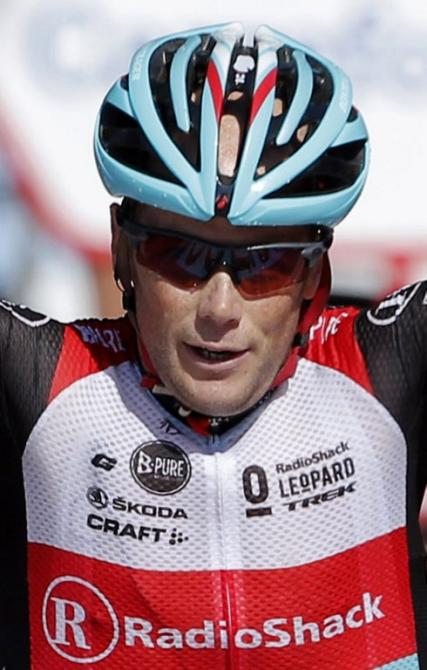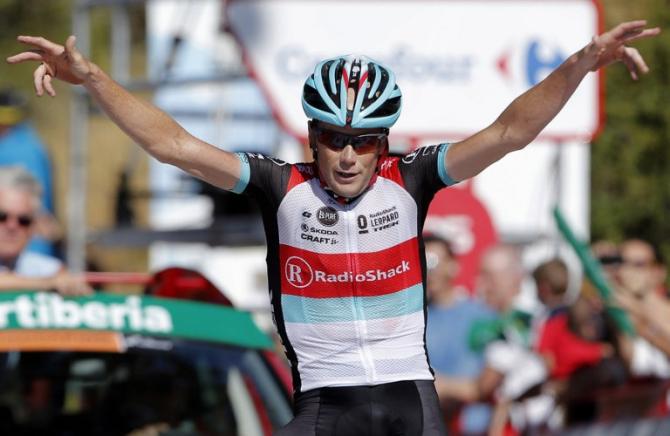Horner back for second stage win and lead in Vuelta a España
American expects to lose the jersey to Nibali in time trial


American veteran Chris Horner (RadioShack-Leopard) is back on top in the Vuelta a España, with a second stage win and a second spell in the overall lead. If the early stage win was more of a skirmish in terms of the general classification, though, this time around Horner has made it clear that he is an overall contender for real by winning atop the Alto Hazallanas.
Taking 48 seconds on Nibali, on paper the top favourite, puts Horner into the top spot by 43 seconds. It’s the first serious gap at the top end of the Vuelta’s GC, and leaves perhaps seven or eight riders at the very most in a position to fight for the overall victory in Madrid.
The 41-year-old’s second stage victory came after an attack four kilometres from the line made when, as he put it, “the others were playing games. I wasn’t surprised about the time gap, I thought if I got 10 or 15 seconds, the rest would start looking at each other because they didn’t have any teammates [to close down the gap].
“Nibali had just attacked, and I knew that he was the strongest of the three [sic] behind. I know Joaquim [Rodriguez] likes to stay on wheels until the very last moment, and I thought, for sure he’ll follow Nibali now and then maybe accelerate late on.”
As it was, NIbali took part in an all-out lone chase, but by then, that was hardly Horner’s concern: when he attacked, he read the race perfectly, to the point where his own most optimistic prediction – “I thought I’d get 30 or 40 seconds” – fell a little short of reality.
Horner said that Movistar had made much of the running earlier on, but that then “[Fabian] Cancellara worked hard for me” and finally that Nibali’s repeated accelerations on the Alto de Hazalllanas had shrunk the group to “maybe five or six riders. I thought maybe at worst I’d be able to continue to reduce the group in size when I attacked.”
Now the leader in the king of the mountains standings ahead of Nicolas Roche (Saxo-Tinkoff), Horner’s climbing skills are in no doubt. But he was more cautious about his chances on the next big challenge, Wednesday’s time trial.
Get The Leadout Newsletter
The latest race content, interviews, features, reviews and expert buying guides, direct to your inbox!
“”I’m not sure what can happen there, it’s been a couple of years since I’ve had a good time trial and I expect I’ll lose the lead to Nibali there,” he said. “Sometimes, sometimes,” he said, repeating the word to emphasise its rarity, “I do a good TT, though.” As was the case when he took one of his best wins so far, the Vuelta al País Vasco back in 2010.
As for the climbs in the Pyrenees, the next big challenge, and how well he knew them Horner said he “could never remember the names of climbs. It’s like today, that second last climb [Monachil], I thought I’d never done it before, but then when we got on it, I was like ‘hey, I remember this from 2006, 2007.’ So when we go north, possibly I know none of them. Possibly I know all of them.”
Even at 41, then, and after 18 years as a pro, new race situations arise and for Horner leading a Grand Tour is a voyage in the dark. So far, though, the American looks to be far from going aground.
Alasdair Fotheringham has been reporting on cycling since 1991. He has covered every Tour de France since 1992 bar one, as well as numerous other bike races of all shapes and sizes, ranging from the Olympic Games in 2008 to the now sadly defunct Subida a Urkiola hill climb in Spain. As well as working for Cyclingnews, he has also written for The Independent, The Guardian, ProCycling, The Express and Reuters.
